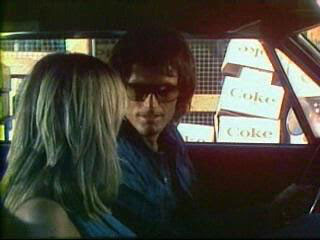 I wish I had the raggedy poncho concession in the mythic Old West where all the spaghetti Westerns take place. I'd be a very rich man. But as The Strangers Gundown illustrates, wealth is no protection when you've got a vengeance-seeking Django on your ass!
I wish I had the raggedy poncho concession in the mythic Old West where all the spaghetti Westerns take place. I'd be a very rich man. But as The Strangers Gundown illustrates, wealth is no protection when you've got a vengeance-seeking Django on your ass!According to IMDB, the original title of The Strangers Gundown, my White Elephant Blogathon movie—and thanks again to Ben & Co. at Lucid Screening for letting me join the fun—is Django il bastardo, so I'm going to call it that. While The Strangers Gundown is a not-inaccurate description of what goes on, I can't figure it out grammatically, since the verb gundown isn't in Webster's, and shouldn't Strangers have an apostrophe? And Django, he is a bastardo.
Since my experience with spaghetti Westerns doesn't go much deeper than Sergio Leone's classic trilogy, I don't really know much about the Django character, who's been played by many different actors. I get the sense that there are a lot of Djangos, and that they don't really have anything to do with each other—kind of the way that every muscleman in a loincloth in Italian peplum sword-and-sandals movies became "Hercules" in the dubbed versions. Or maybe Django's just a really popular name among the cheroot-chewing gunfighter set.
In the beginning of the movie our particular Django (Anthony Steffen) is seeking some unspecified revenge, and he has a pretty baroque way of going about it: he has a grave marker made with his victim's name on it and that day's date, then provokes the guy into a gunfight (or, well, a gundown). Ultimately he's after a pair of brothers, mastermind Rod Murdok (Paolo Gozlino) and loose cannon Luke (Luciano Rossi, who lays on the crazy with a trowel). Along the way he wastes a small army of killers that Murdock hires in a futile attempt to protect himself. Murdok was Django's superior officer in the Confederate army—when Murdok sold out his company, Django and his comrades were set up to be slaughtered.
Back in the present, Murdok has his men evacuate the prosaically named Desert City, the better to hunt down Django, and the last act of the movie plays out as an extended game of cat and mouse. Django's not a character so much as a gimmick, but as far as gimmicks go, it's a good one: he's like the Shadow, appearing suddenly and lethally out of the darkness, showing up in impossible places and vanishing just as mysteriously, standing silently in the background until time to strike. Director Sergio Garrone is endlessly inventive in terms of contriving ways for Django to show up in the frame, with nobody—including we the audience—realizing he was there all along! In the movie's wittiest moment, he sits in the saloon playing solitaire while Murdok's killers plan to go out and hunt him down. I was pretty sure he was a ghost, a la High Plains Drifter, until Luke Murdok gets the drop on him, and he turns out to be very much flesh and blood.
There was no question how Django il bastardo was going to end, but it was still more entertaining than I expected it to be, getting to that point where he and Rod Murdok square off, Murdok's grave marker standing between them.






